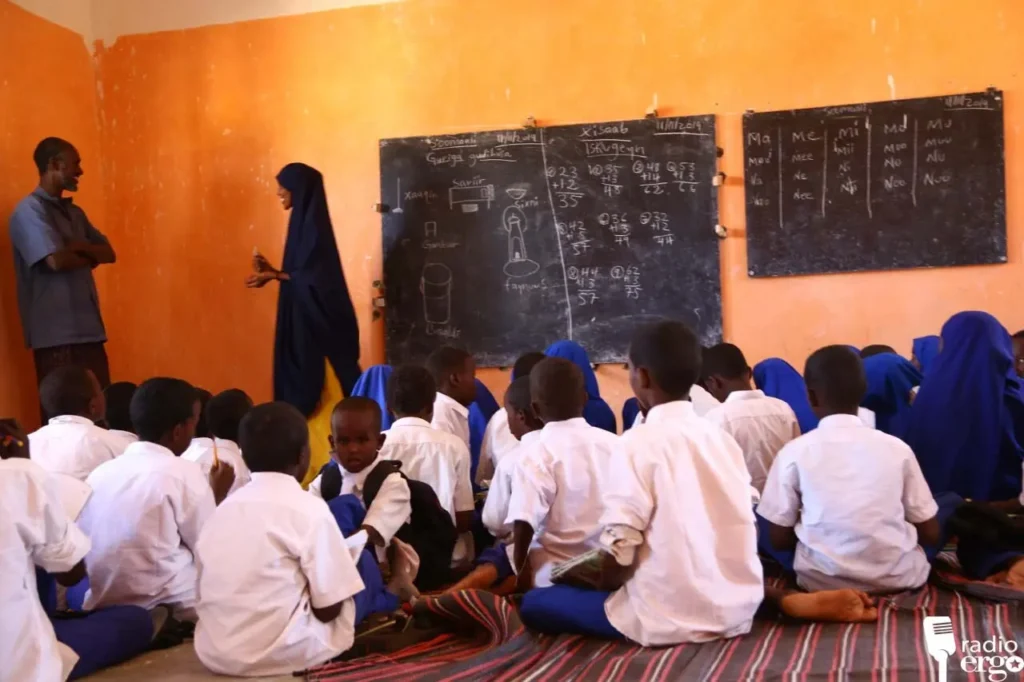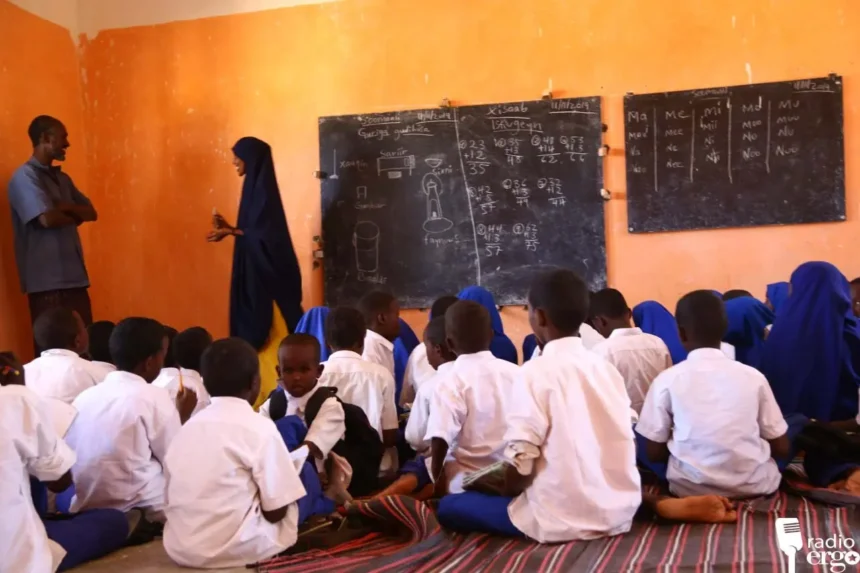
(ERGO) – A free school on the outskirts of Baidoa is providing children from displaced and poor rural families with their first opportunities for education.
Yusuf Mohamed Nur, 72, currently living in Aburow IDP camp, has enrolled all his eight children in Aburow school. He said he is happy to see them in the classroom for their first time.
“I was worried because I have these children but they didn’t have an education. I was worried about where I would take them, but now I thank God and we appreciate the aid organisation that brought us this school,” he said.
Aburow school was opened in Wargadud area near Baidoa in May by a local NGO and the opportunity to enroll children was presented to the community by the camp leaders.
Yusuf’s children now attend the school five days a week. With no prior education, his eldest son, 15, and his youngest, 7, are both in the first grade.
He told Radio Ergo he had already noticed improvements among his children since they started school. The family owned a three-hectare farm and 15 goats in Mora-Gabey village in Bakool region, but prolonged drought destroyed the farm and killed the livestock forcing them to flee in December 2022.
They walked for four days to reach the IDP camps near Baidoa town, where they hoped to find a better life. Life is still a struggle though and it’s hard to make ends meet.
Yusuf, who used to earn about $4 a day as a porter, hasn’t worked for eight years due to old age. His wife has been supporting them with the 40,000 Somali shillings ($1.5) she makes selling firewood in the camp. This gets them one meal a day.
They live in a makeshift house made of plastic bags and pieces of clothes mounted on a flimsy wooden frame. There is no water in the camp so they have to budget to buy 20 litres of water to meet their most basic needs.
Going to school would therefore not have been an option for Yusuf’s children without the new school.
“My children got books and pens, but I don’t have money to replace them so I’ll talk to my relatives to help buy them,” he said.
In the same camp, Biley Sheikh Hussein, a mother of 12, said she always wanted to send her children to school but she couldn’t afford to pay their fees. The free school is their first opportunity.
“When I relocated my children from the rural areas they didn’t know anything. But now they are better, they can read and write. We have got benefits from this education and we thank God,” she said.
Biley’s children, from her eldest daughter aged 16 to her youngest son aged six, are studying mathematics, Somali and Arabic languages, and science.
She collects firewood from four kilometres outside the camp to sell to IDPs, making about $2 a day that barely covers their basic needs. Her husband is elderly and does not work.
“We cook one meal in a day, we only drink water for the rest of the day. The children get food at night but we can’t always get food,” she said.
Biley and her family were displaced from Qoryolley, Lower Shabelle in 2019. She owned 21 goats although they all perished in the prolonged drought.
Aburow school head teacher, Batulo Mohamud Mohamed, said there are 370 students enrolled, ages from 6 to 16. The school was established by Gargaar Relief and Development Organisation (Garedo), and draws children from IDP camps including Aburow, Burey, Berdale, Haraw and Toosile, as well as some from Bonkay, Toos-wayne and Wargudud villages in Bay region.
Batulo said learning was going well although they needed more equipment and supplies to assist children from poor backgrounds.
“We don’t have record books for the students, apart from the normal books, but we have got a chalk board, chairs, the classrooms and toilets,” she said.
Source: Radio Ergo


Leave a Reply